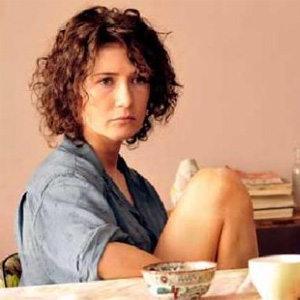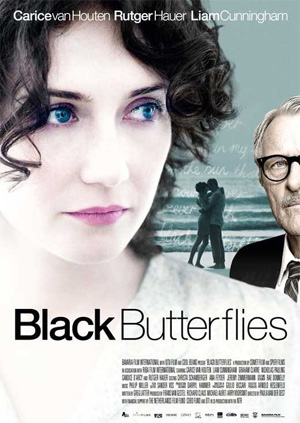DVD Review: Black Butterflies (2011)
Cast: Carice van Houten , Rutger Hauer , Liam Cunningham
Director: Paula van der Oest
Country: Germany | Netherlands | South Africa
Genre: Drama
Official Trailer: Here
Purchase Now!
Editor’s Notes: Black Butterflies releases 7/17/2012 on DVD from Newvideo.
A an attractive female poet is rescued from the sea by a seasoned male writer. This happenstance collision of fate would change the lives of these two forever, as we never really know when someone that will be crucial to our existence will stumble (or swim) into our lives. Carice van Houten’s Ingrid Jonker masks great pain under her carefree wisps of hair and infectious smiles. It is a pain honed by a lifetime of internal scars as she tries desperately to gain the affection and approval of her tyrannical father (menacingly portrayed by Rutger Hauer). Ingrid’s chance encounter with Liam Cunningham’s Jack Cope will bring new excitement and passion into her life, but the temporary elation of new love will eventually erode and expose the deep cracks lying just below the surface. This would be Ingrid’s chance to clean the slate and live a lifestyle more suited for satiating her poetic curiosities, but the inescapable pain that lives in the darkest recesses of our minds will eventually resurface, and truly satisfying closure is usually something that only happens in the movies.
It is a pain honed by a lifetime of internal scars as she tries desperately to gain the affection and approval of her tyrannical father (menacingly portrayed by Rutger Hauer).
 This chance encounter would unite these two passionate and creative minds, and each would let the other in on their dark secrets, hidden pain, and covert altruism. Their two worlds would collide and create unlikely alliances and devastating family rifts. These rifts would come from the shocking dehumanization that occurred in 1960s apartheid infested South Africa, and Ingrid’s father is Minister of censorship. This position makes him as diametrically opposed to the humanist poet as one could get, yet despite her vehement opposition to her father’s politics, Ingrid still desperately seeks his approval. This approval may never come, as Rutger Hauer’s portrayal of Abraham Jonker shows us a man who is damaged and old-fashioned in all of the most terrifying ways. His bigotry is unwavering, and in one conversation he actually posits sympathetic attitudes toward the Nazis. Ingrid is a much kinder (but deeply damaged) soul than her father, and she scrawls her frantic poetry on the servant quarter walls of her childhood in a desperate attempt to gain the affection and approval of her cruel and uncaring father, but these futile attempts at bringing him to an understanding of his fatal flaws will only act as a catalyst that fuels Ingrid’s inner darkness.
This chance encounter would unite these two passionate and creative minds, and each would let the other in on their dark secrets, hidden pain, and covert altruism. Their two worlds would collide and create unlikely alliances and devastating family rifts. These rifts would come from the shocking dehumanization that occurred in 1960s apartheid infested South Africa, and Ingrid’s father is Minister of censorship. This position makes him as diametrically opposed to the humanist poet as one could get, yet despite her vehement opposition to her father’s politics, Ingrid still desperately seeks his approval. This approval may never come, as Rutger Hauer’s portrayal of Abraham Jonker shows us a man who is damaged and old-fashioned in all of the most terrifying ways. His bigotry is unwavering, and in one conversation he actually posits sympathetic attitudes toward the Nazis. Ingrid is a much kinder (but deeply damaged) soul than her father, and she scrawls her frantic poetry on the servant quarter walls of her childhood in a desperate attempt to gain the affection and approval of her cruel and uncaring father, but these futile attempts at bringing him to an understanding of his fatal flaws will only act as a catalyst that fuels Ingrid’s inner darkness.
Alcohol offers temporary reprieve from the pain caused by Ingrid’s inescapable humanism in times of apartheid and the unyielding insults of her tyrannical father, but such salve only offers temporary comfort to the deepest internal wounds, and our temporary fixes seem to have a way of becoming our permanent problems. When the political climate begins to shift in the breezes of social conflict as it always does and Jack departs to spend time with his neglected family, Ingrid is driven to jump headfirst into her own private pain and finds herself on a reckless path that takes her to dangerous places to carry out secret self-destructive deeds. She is always looking for an opportunity to escape her unlivable reality, but it is only through the observation of grave injustice and the misfortune of others that she finds the necessary selflessness to channel a generation’s pain through her poetry. It is a process that would ultimately destroy her, but in an insane world the sane are subject to the harshest forms of persecution.
When the political climate begins to shift in the breezes of social conflict as it always does and Jack departs to spend time with his neglected family, Ingrid is driven to jump headfirst into her own private pain and finds herself on a reckless path that takes her to dangerous places to carry out secret self-destructive deeds.
 Based on the true story of South Africa’s preeminent anti-apartheid poet, Black Butterflies is a devastating tale of a deeply flawed and damaged individual, but such damage is inevitable to the soul too sensitive to the pain and suffering of others. Were her self-destructive tendencies merely the act of a frightened and neglected child that desperately sought the love of a father who was incapable of expressing it, or were they the heroic deeds of a woman too sensitive for the unjust times in which she lived? One can never truly know what drives a person’s most noble and ignoble deeds, but through her poetry some were able to find temporary relief from the unbearable sting of apartheid, and for that her struggles were not in vain. One may wonder why people that live in times of repression and social injustice would choose to continue living in such a society, but subversion is most effective from within. When fighting grave social injustice, the most effective battles are those that happen on home turf so that the lessons of that battle can be internalized and used to shape the strategy of the next skirmish for justice. There will be casualties along the way, but those that fall will have forever changed the world through the altruistic nature of their ultimate sacrifice.
Based on the true story of South Africa’s preeminent anti-apartheid poet, Black Butterflies is a devastating tale of a deeply flawed and damaged individual, but such damage is inevitable to the soul too sensitive to the pain and suffering of others. Were her self-destructive tendencies merely the act of a frightened and neglected child that desperately sought the love of a father who was incapable of expressing it, or were they the heroic deeds of a woman too sensitive for the unjust times in which she lived? One can never truly know what drives a person’s most noble and ignoble deeds, but through her poetry some were able to find temporary relief from the unbearable sting of apartheid, and for that her struggles were not in vain. One may wonder why people that live in times of repression and social injustice would choose to continue living in such a society, but subversion is most effective from within. When fighting grave social injustice, the most effective battles are those that happen on home turf so that the lessons of that battle can be internalized and used to shape the strategy of the next skirmish for justice. There will be casualties along the way, but those that fall will have forever changed the world through the altruistic nature of their ultimate sacrifice.






















 Blu Review: Badlands (1973)
Blu Review: Badlands (1973) Review: Room 237 (2012)
Review: Room 237 (2012) SXSW Review: A Teacher (2013)
SXSW Review: A Teacher (2013) Review: The Incredible Burt Wonderstone (2013)
Review: The Incredible Burt Wonderstone (2013) Review: Spring Breakers (2012)
Review: Spring Breakers (2012)




